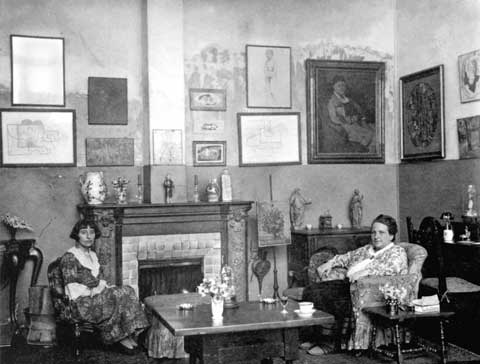Summary | Excerpt | Reading Guide | Discuss | Reviews | Beyond the Book | Read-Alikes | Genres & Themes | Author Bio

Critics' Opinion:
Readers' Opinion:
First Published:
May 2020, 272 pages
Paperback:
May 2021, 272 pages
 Book Reviewed by:
Book Reviewed by:
BookBrowse First Impression Reviewers
Buy This Book
This article relates to The Paris Hours
 A number of real historical figures play tangential roles in The Paris Hours, which is set in Paris in 1927. One of these is Gertrude Stein, a writer known for her poetry and the quasi-fictional memoir she penned about her life in Paris with her longtime partner, The Autobiography of Alice B. Toklas (1933). But Stein may be even better known as a patron of artists and other writers, and the leader of a salon that served as a meeting ground for some of the most famous literary figures and artists of the time, many of them American expatriates, including Ernest Hemingway, F. Scott Fitzgerald and Sinclair Lewis.
A number of real historical figures play tangential roles in The Paris Hours, which is set in Paris in 1927. One of these is Gertrude Stein, a writer known for her poetry and the quasi-fictional memoir she penned about her life in Paris with her longtime partner, The Autobiography of Alice B. Toklas (1933). But Stein may be even better known as a patron of artists and other writers, and the leader of a salon that served as a meeting ground for some of the most famous literary figures and artists of the time, many of them American expatriates, including Ernest Hemingway, F. Scott Fitzgerald and Sinclair Lewis.
Gertrude Stein was born in Allegheny, Pennsylvania in 1874, but spent the first few years of her childhood traveling around Europe with her parents (who were German Jewish immigrants) and brothers. When the family returned to the States they moved to Oakland, California, where Stein lived until she turned 18 and left home to attend Radcliffe College (the female division of Harvard before the university went coed). Here she studied under the famed psychologist William James (brother of writers Henry and Alice James), who encouraged her to go on to medical school. Stein enrolled at Johns Hopkins but dropped out before graduating, deciding instead to follow her older brother Leo back to Europe, settling in Paris in 1903. She met Alice Toklas there in 1907.
Both of Stein's parents had died by the time she turned 18, leaving the Stein siblings a fairly tidy inheritance. With their money, Leo and Gertrude began amassing an art collection in Paris, purchasing paintings by Gauguin, Cézanne and many other artists whose stars were on the ascent. As she amassed their work, she inevitably came to know these artists, and she also developed friendships in the Parisian literary scene as she began to establish herself as a writer. Her first publication was a triptych of novellas called Three Lives (1909). This was followed by Tender Buttons (1914), a collection of poems that demonstrates Stein's increasingly experimental writing style. The Autobiography of Alice B. Toklas is the most famous of Stein's books, and the only one to be a critical and commercial success (though it was maligned by many of Stein's famous friends, who felt they had been misrepresented by her).
For decades, Stein held a Saturday night salon at her home at 92 rue de Fleurus, which was a hub for modernist writers and artists. Stein served as something of a mentor to Hemingway during this time, though they later quarreled over his complaints about The Autobiography of Alice B. Toklas. In addition to those previously mentioned, Henri Matisse, Georges Braque, Pablo Picasso, Ezra Pound, and Guillaume Apollinaire were frequent attendees. Alice Toklas, who served as Stein's secretary in addition to being her romantic partner, was expected to entertain the visitors' wives in another room.
Stein was a prolific writer, but her work is not widely read today, in part because it is so experimental as to prove opaque to many. Nevertheless, she has undoubtedly left her mark on the world. Quotes from her work such as "Rose is a rose is a rose" and "There is no there there" are part of the cultural lexicon. She inspired and guided a number of the greatest artists and writers of the 20th century and her style informed the work of those who came after her, particularly the New York School of poets.
During World War II, Stein aligned herself with the Vichy regime, which has left a stain on her memory and reputation, as many view her as Nazi collaborator. She died in 1946 at the age of 72 of complications from stomach cancer.
by Lisa Butts
Gertrude Stein (right) and Alice B. Toklas (left) in their living room at 92 rue de Fleurus in 1923, courtesy of Jewish Women's Archive
Filed under Books and Authors
![]() This "beyond the book article" relates to The Paris Hours. It originally ran in May 2020 and has been updated for the
May 2021 paperback edition.
Go to magazine.
This "beyond the book article" relates to The Paris Hours. It originally ran in May 2020 and has been updated for the
May 2021 paperback edition.
Go to magazine.





The Flower Sisters
by Michelle Collins Anderson
From the new Fannie Flagg of the Ozarks, a richly-woven story of family, forgiveness, and reinvention.

The House on Biscayne Bay
by Chanel Cleeton
As death stalks a gothic mansion in Miami, the lives of two women intertwine as the past and present collide.

The Funeral Cryer by Wenyan Lu
Debut novelist Wenyan Lu brings us this witty yet profound story about one woman's midlife reawakening in contemporary rural China.
Your guide toexceptional books
BookBrowse seeks out and recommends the best in contemporary fiction and nonfiction—books that not only engage and entertain but also deepen our understanding of ourselves and the world around us.